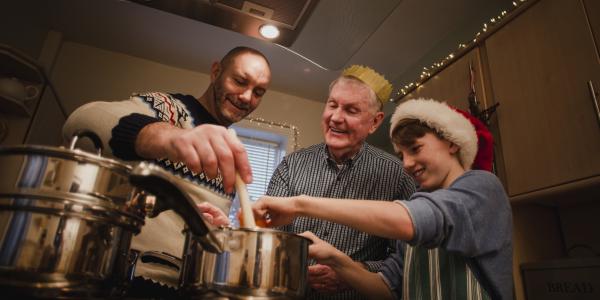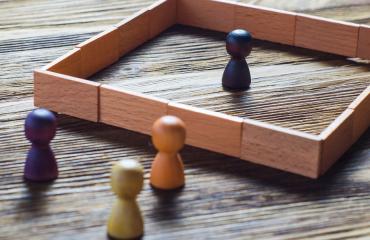
For many people, the holidays are a time of traditions, with a lot of them around food. Baking holiday treats, serving family favourites and gathering for special meals. This year, I want to challenge us to think about food in a different way during the holidays. What if we were to include the entire family, or a group of friends, and learn new cooking skills together?
Now, I realize the idea of including friends and family—especially kids— in cooking over the holidays can seem stressful. As the dietitian on the Healthy Schools Team, I cook with elementary school classes throughout the school year, making things like muffins, broccoli cheese egg cups, and spaghetti together, so I get that cooking and eating together can be challenging. It takes interest and thoughtful planning, and improving cooking skills requires time and practice, especially when cooking from scratch.
Let's take a step back and think about eating itself. Eating is more than just chewing and swallowing nutrients. Whether we realize it or not, eating ties in with our own identity, our sense of belonging, and our social, cultural, and environmental values. The way we approach eating and the way we prepare our food has an impact on them.
For example, consider the ultra-processed foods such as ready-to-eat microwaveable meals, snack-packs, or chips and pop. These foods are everywhere. No, really, I mean ev-er-y-where! They’re advertised to promote social connection when in reality they support eating alone. They appear to save you time, maybe even money, but what are the other consequences? A serious long-term concern is they create a false sense of belonging while preventing us from cooking and eating together and learning food skills from each other. They can negatively affect sharing of culture and diversity by limiting the opportunities for meal making together and for interactions between generations.
I think we can all agree that spending time connecting with our friends and family is important. Consider sharing food, recipes, healthy eating tips and food prep skills with each other, especially with younger generations throughout 2018. In fact, a recent long-term Canadian study suggests children whose families regularly eat meals together tend to have better social skills and fitness levels.
Maybe start out by cooking just one dish as a group rather than a four-course meal. We've all been there (or at least I know I certainly have been), where we set our goals beyond what we can realistically manage, only to become discouraged when something didn't turn out the way we imagined... Mind you, some of the Pinterest fail photos are pretty hilarious!
If you are able, let the kids plan the meal, search for recipes, and help with the grocery shopping. Invent fun food games or challenges. For example, see who can create the tastiest and healthiest granola and do a breakfast taste test. The possibilities are endless!
If kids or teens don't want to join in due to fear of messing something up, try to agree on tasks that are fun and challenging but not too hard that they become frustrated. Remember that cooking can sometimes be (very) messy, mistakes can happen, and as long as nobody gets hurt it's okay. For age-specific tasks visit Eat Right Ontario’s Cooking with Kids.
I know that some holiday traditions and activities will take priority (the great outdoors are calling!) and cooking might take a backseat. But if and when the opportunity comes up, join together as a group to plan, cook, clean, share ideas and make new traditions!
What do you think? What's been your experience with cooking with others? Has it been a rewarding experience? Worth the hassle? Share with us any insights you've had in the comments below!

